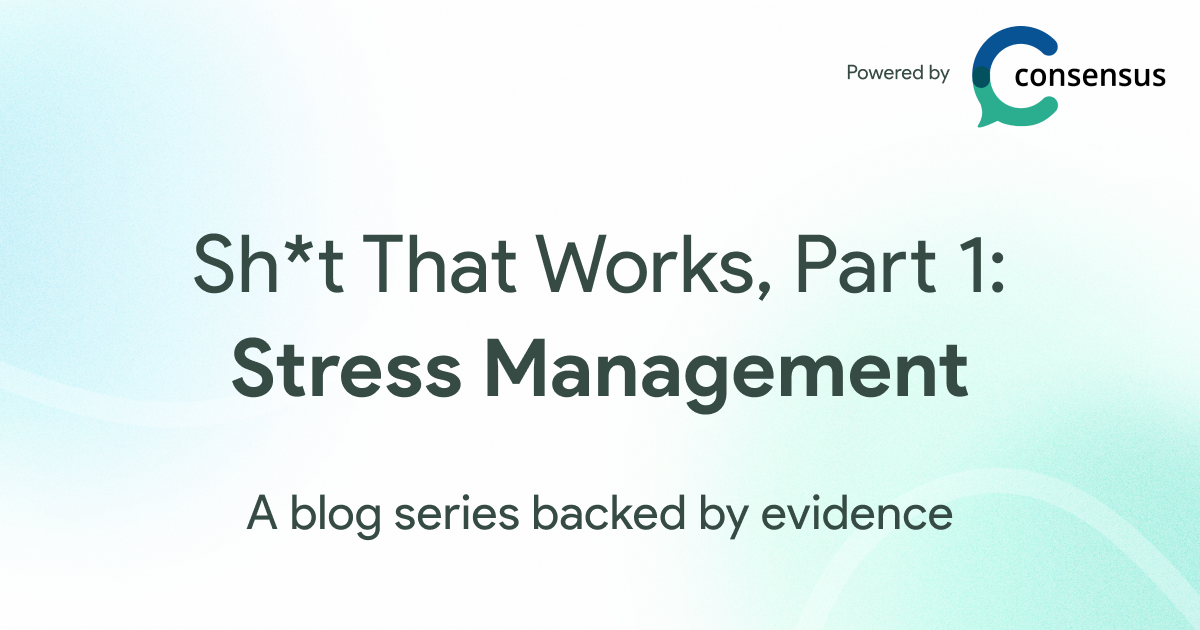Sh*t That Works, Part 1: Stress Management

We wanted to create Consensus to make getting good information easy. There is so much information in the world, yet so little of it is based on real evidence.
For many subjects and debates, the evidence exists, its just hard to find, and even harder to consume.
This series will take a variety of important topics and discuss we actually can conclude based on real, research-backed evidence. We’re calling it: “Sh*t That Works”.
Of course, this will all be done with the help of Consensus.
Disclaimer: I am not a trained a medical professional. I just read lots of studies for my job
Stress Interventions That Aren’t Bulls–t
There are an estimated 300 million people across the globe who suffer from an anxiety disorder – countless more deal with periodic bouts of stress and anxiety
Unfortunately, despite this, popular media continues to churn out click-bait-y content focused on interventions that lack any real evidence of efficacy.
Today, we are going to dive into four interventions for stress management that actually work:
Intervention that works #1: Exercise
Evidence to care about #1: 2017 Meta-Analysis
TLDR; this meta-analysis looked across six randomized controlled trials, totaling over 250 participants and found that exercise was effective in reducing anxiety symptoms for those with a panic disorder.
Evidence to care about #2: 2018 Meta-Analysis of RCT’s
TLDR; this meta-analysis looked across 14 randomized controlled trials, totaling over 1k participants and found that exercise was effective in reducing anxiety symptoms for adults with arthritis and other rheumatic diseases.
Exercise takeaway:
Shocker, I know. Exercise is shown across the research to be an effective intervention in combating symptoms of anxiety across multiple populations.
Intervention that works #2: Mindfulness practice
Evidence to care about #1: 2010 Meta-Analysis
TLDR; this study looked across 39 studies and over 1k participants and found that mindfulness-based therapy was moderately effective in improving anxiety symptoms and is a promising clinical intervention.
Evidence to care about #2: 2012 Randomized Controlled Trial
TLDR; this RCT measured the impact of mindfulness-based stress management in 31 subject with generalized anxiety disorder, they found “significant” reductions in anxiety, depressive and worry symptoms.
Mindfulness therapy takeaway:
There are many ways to practice mindfulness, like meditation, but regardless of the exact flavor, this intervention is consistently found to have significant, measurable effects in reducing both anxiety and a variety of other mental health symptoms.
Intervention that works #3: Ashwagandha (supplement)
Evidence to care about #1: 2012 Randomized Controlled Trail
TLDR; this double-blind randomized trial of 64 subjects found that ashwagandha effectively improved resistance stress and improved quality of life
Evidence to care about #2: 2019 Randomized Controlled Trail
TLDR; this double-blind randomized trial of 58 healthy subjects found that ashwagandha reduced cortisol levels, improved sleep quality and reduced overall levels of stress and anxiety
Ashwagandha (supplement) takeaway:
You would be right to be skeptical of all things supplements when it comes to clinical psychology problems. But, as far as over-the-counter supplements go, ashwagandha is a standout. Multiple high-quality studies have found real, measurable impacts across multiple markers of stress and anxiety. Studies have also have found a consistent mechanism in that ashwagandha improves the body’s ability to deal with stress.
Intervention that works #4: Saffron
Evidence to care about #1: 2016 Randomized Controlled Trail
TLDR; this RCT that included sixty patients found that 50mg of saffron had a ‘significant impact’ on the treatment of mood disorders
Evidence to care about #2: 2017 Randomized Controlled Trial
TLDR; this study found that saffron was efficacious and tolerable for patients with depressive disorder and anxious distress
Exercise takeaway:
I knew about ashwagandha as a stress-related intervention that wasn’t total bullsh–t coming into writing this article – I can’t say the same about Saffron. While it is still early in the clinical evaluation of this supplement, the early evidence is surprisingly promising for this widely available plant. Saffron has been shown across human randomized control trials to be a promising intervention for reducing symptoms of anxiety and stress.

